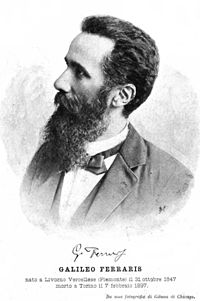Galileo Ferraris
Galileo Ferraris (Livorno Ferraris, 31 de outubro de 1847 — Turim, 7 de fevereiro de 1897) foi um físico e engenheiro eltricista italiano.
| Galileo Ferraris | |
|---|---|
| Conhecido(a) por | Corrente alternada |
| Nascimento | 31 de outubro de 1847 Livorno Ferraris |
| Morte | 7 de fevereiro de 1897 (49 anos) Turim |
| Nacionalidade | Italiano |
| Campo(s) | Física, engenharia elétrica |
É conhecido por seus estudos e descoberta independente do campo magnético girante, um princípio de funcionamento básico do motor de indução.[1][2][3] Ferraris publicou uma monografia extensa e completa sobre os resultados experimentais obtidos com transformadores de circuito aberto do tipo projetado pelos engenheiros Lucien Gaulard e John Dixon Gibbs.
Publicações editar
Referências
- ↑ Gisbert Kapp e William Stanley, Jr.: Alternating currents of electricity: their generation, measurement, distribution, and application. Johnston, 1893. página 140. [cf., This direction has been first indicated by Professor Galileo Ferraris, of Turin, some six years ago. Quite independent of Ferraris, the same discovery was also made by Nikola Tesla, of New York; and since the practical importance of the discovery has been recognized, quite a host of original discoverers have come forward, each claiming to be the first.]
- ↑ Larned, J. N., & Reiley, A. C. (1901). History for ready reference: From the best historians, biographers, and specialists; their own words in a complete system of history. Springfield, Mass: The C.A. Nichols Co.. p. 440. [cf., At about the same time [1888], Galileo Ferraris, in Italy, and Nikola Tesla, in the United States, brought out motors operating by systems of alternating currents displaced from one another in phase by definite amounts and producing what is known as the rotating magnetic field.]
- ↑ The Electrical engineer. (1888). London: Biggs & Co. p., 239. [cf., "[...] new application of the alternating current in the production of rotary motion was made known almost simultaneously by two experimenters, Nikola Tesla and Galileo Ferraris, and the subject has attracted general attention from the fact that no commutator or connection of any kind with the armature was required."]
Ligações externas editar
- Katz, Eugenii, "Galileo Ferraris". Biosensors & Bioelectronics.
- Istituto Elettrotecnico Nazionale Galileo Ferraris (IEN) – Official web site (English)
